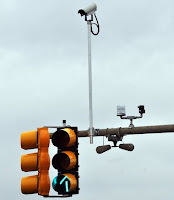Every year nearly 1,000 people die and about 90,000 people are injured from red light running car crashes nationally racking up millions in property damage, medical bills, lost productivity and insurance hikes. And it’s only get worse as the number of people getting into crashes from running red lights increases. “According to the Federal Highway Administration, 96 percent of drivers fear being hit by a red light runner upon entering an intersection, yet 55.8 percent admit to running red lights (2. Driving, Drivers and Cars.).” So what can be done to prevent people from running red lights and getting into crashes? The answer is traffic cameras. Cameras are set up at thousands of stop lights across the United States and they aren’t a secret. They are made publicly know so that the people will be more cautious at intersections and abide the law so there will be fewer accidents.
Source: dallascityhall.com
Video: http://www.youtube.com/watch?v=JS0NW1X_Njw
Traffic Cameras are Positive for the Economy
Thursday, May 10, 2012
Goals of traffic cameras
One of the biggest myths about traffic cameras is that their one and only goal is to create revenue from the people getting ticketed. That’s false they were created to protect the public and enforce the law that has been around since we’ve been driving. It’d be the same if we had a police officer at those intersections 24/7 but this way saves the economy money. “So the true goals of the traffic cameras are to reduce instances of angle collisions at selected intersections and reduce instances of red light running at selected intersections (6 Web).”
Source : funsandsmiles.blogspot.com
Link: http://www.ci.el-paso.tx.us/_documents/fact%20sheets/FACTSHEET%20-%20Red%20Light%20Cameras%20UPDATED.pdf
Source : funsandsmiles.blogspot.com
Link: http://www.ci.el-paso.tx.us/_documents/fact%20sheets/FACTSHEET%20-%20Red%20Light%20Cameras%20UPDATED.pdf
Cameras pay for themselves
Many people believe that the government pays for the traffic cameras with the tax money we pay. But the money actually comes from a public safety budget (5 Safety Evaluation of Red-Light Cameras). Then once a few cameras are installed and the tickets start coming in the money paid by the people who get the tickets goes back into funding for the cameras. So if you don’t want to pay for the tickets don’t speed or run red lights.
Source: http://www.flickr.com/photos/tracy_olson/61056391/
Link: http://www.fhwa.dot.gov/publications/research/safety/05048/1.cfm
Source: http://www.flickr.com/photos/tracy_olson/61056391/
Link: http://www.fhwa.dot.gov/publications/research/safety/05048/1.cfm
Tax payers don’t have increased taxes from cameras
Another myth about cameras is that we have raised taxes to pay for the cameras but we already know they pay for themselves. The programs revenue from citations will match the camera vendor’s monthly service fee (5 Safety Evaluation of Red-Light Cameras). The vendor will absorb any cost overrun therefore the tax payer will not suffer any increased taxes from the need to fund the program.
Source: macpro.freeshell.org
Link: http://www.statesman.com/news/texas/perry-promotes-compact-to-ensure-no-new-taxes-2307442.html
Source: macpro.freeshell.org
Link: http://www.statesman.com/news/texas/perry-promotes-compact-to-ensure-no-new-taxes-2307442.html
Some revenue created from the cameras goes to various road/ other improvements
For every speeding ticket or ticket from running a red light a small percentage of money goes to road improvements. And a larger percent goes to the police. With the cameras the police are not the ones giving out the tickets so more money from the tickets go to various road improvements. So “the rich and reckless are just subsiding those who drive responsibly” (7 Where Does Speed Camera Cash Go). That’s saying those who don’t care and continue to get speeding tickets are just paying for various road improvements for the people who abide the law and don’t get tickets.
Source: bigamericannight.com
Link:
Source: bigamericannight.com
Link:
Helping the enviroment helps the economy
With the speed cameras in place people are driving slower. Lower speed is more efficient leading to lower fuel consumption (3 Advantages of Speed Cameras). This will help reduce carbon emission and global warming. With the reduced fuel consumption and lower carbon emission the air will become cleaner (3 Advantages of Speed Cameras). The government will be able to spend less on cleaning pollution and the money can go to other things. So with the cameras in place people will be speeding less, creating cleaner air, and save money.
Source: telesaur.com
Link: http://www.transportenvironment.org/news/more-evidence-low-speeds-mean-clean-air
Source: telesaur.com
Link: http://www.transportenvironment.org/news/more-evidence-low-speeds-mean-clean-air
Supply and Demand of Cameras
With the rate of car accidents rising every year the demand for cameras is high. With the high demand for cameras the supply for cameras needs to be just as high. The more the cameras prove to have good results the more positive they are for the economy so the demand rises and so does the supply. As long as the cameras continue to work they will have a high demand along with high supply and will continue to have a positive effect on the economy.
Source: masslive.com
Link: http://thegazette.com/2012/04/19/we-need-more-traffic-cameras-not-fewer/
Source: masslive.com
Link: http://thegazette.com/2012/04/19/we-need-more-traffic-cameras-not-fewer/
Subscribe to:
Comments (Atom)






